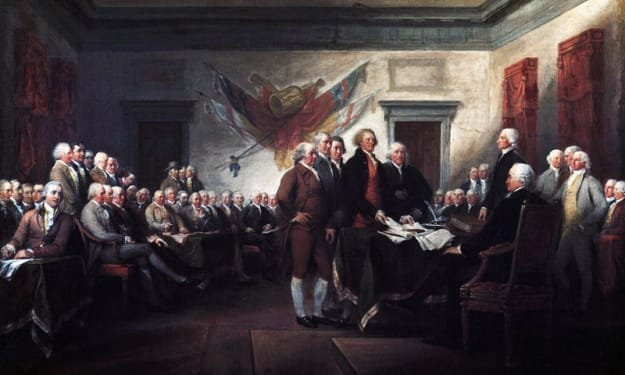People Hearing Without Listening
My Common Experiences With Christians

We need a story. We orient our life on the trajectory of getting from one place to another. We base our opinion on ourselves through our percieved status—both personally and socially. But life is unbearably complex. Its layers are infinite. We are bound to miss something along the way. Not only that, but our personalities and life experiences guide our interests, limiting what we spend our time with; thus limiting what we can become an expert in. For such reasons, we rely on preexisting stories - narratives, rules, guides, and dogmas that have gone before us - to save the time and energy it would take to make a fully formed decision on a path in life. The ability to capitalize on others' wisdom is what makes us human. We are not bound by trial and error of our own stupidity and success. We can save ourselves much suffering by listening to what others have found useful. But this unbearably valuable niche has its downfalls.
While group thinking is a way of finding where the gold is without digging everywhere you go, it also can serve as a blindfold for new ways to live. Rules of thumb are never permanent enough to survive every time and environment. They serve a purpose for a time and place, but they must have the capacity to update, or when the waters rise, the flood will come without and ark to board—all because the old rules did not account for such a thing as rain.
When I hear people speak to me about my failure to find God, I have great trouble continuing to (for lack of a better metaphor) give the devil his due. The people I come across do not appear to have any capacity to update their map of the world; they seem only to be interested in making sure my map is the same as theirs. Now, one could—perhaps justifiably—say, "Geno, aren't you doing the same thing by trying to convince others that their map is wrong?" To which, of course, I must answer with a yes. The only difference I find between my character and theirs is that I constantly change my perspective on life as I become informed by my atlas' flaws. This feature appears non-existent in the people so desperate to get me to drink their Kool-Aid.
I will give a personal example. When COVID-19 broke out, I was willing to comply with mask mandates and forgive the changing narrative of how we could get the virus under control. We knew too little to make inerrant claims. When the vaccine came out, I was willing to reach out my arm in a sign of trust, hoping that if the world came together to solve a problem, perhaps it was possible that they could find the solution to a vaccine so quickly. I cautiously shared my reasons for getting the first two doses of the vaccine and attempted to vouch for a benefit-of-the-doubt view of why it could be beneficial. However, as time went on and new data arose, it became more and more apparent that not only were the narratives of the pandemic being dealt with dishonestly (given the considerable efforts to silence the idea of the virus being a lab leak, it now appears it could have been the case), but the narrative of the vaccines was as well (Pfizer appears to have known that their vaccines were correlated to myocarditis as early as the first quarter of 2022, but they did not alter their narrative of it being perfectly safe and effective). At this moment, I am still willing to believe that the vaccine may have served beneficial for those who were already immunocompromised—such as the old or obese—but I am not keen to promote anyone takes it if they are young, healthy, or have already gotten the natural antibodies by having already contracted the virus. This is an example of personal honesty. It is this form of perspective transformation that I find overall lacking in the religious community.
For example, I have had multiple conversations with people about the biological links to homosexuality. Regardless of how much evidence I present, each conversation ends with the usual, "That's just fake science that was used as propaganda for the LGBTQ movement to get the laws to change." While I understand there is no shortage of reasons to be skeptical of scientific claims, I must ask, can you provide an alternative?
The scientific enterprise is the best method we have to find the truth. How can I make such a claim? Let me explain. A scientist will notice a pattern. They will then go through a process of trying to observe and analyze the source of that pattern. If their results do not match their original hypothesis, they have new ground to study, looking for an answer to why that pattern exists. This process is moderated alongside other experts who carefully monitor that the scientist behaves ethically towards their participants, and are statistically and practically sound in their methods. If the scientists find results that are not repeatable, the data are scrapped, and the whole process begins anew, seeking further understanding. If it is reliable (e.g., something repeatable), the scientist is likely onto something significant and may make a claim on the nature of that pattern. Once again, I must ask you, do you have a better alternative? Would you propose all ideas be posited without accountability or verification? Should the way something makes you feel be a replacement for the scientific endeavor? Should everything be left up to the whims and bowel movements of everyone around us? Can you posit any better alternative to the process filled with accountability, repeated updates, and scrutiny? Of course, the scientific enterprise has bad apples in the barrel. Of course, profit-making companies are incentivized to take the easy way out. But let's not throw the baby out with the bath water.
Unfortunately, it appears most of my religious friends prefer no baby or bath water. They insist that their God is the source of all truth and that if He wanted them to know something, the Holy Spirit would be kind enough to inform them about it. Would you like a clue as to what our world would look like if everyone behaved this way? I challenge you to read the history of the world before the secular and scientific revolution came about. There was a thousand-year reign of the Catholic church. They acted as judge, jury, and executioner in their laws. Galileo was imprisoned because he posited that our home was not the center of the universe. Joan of Arc was burned at the stake for questioning the omniscience of the church. Nearly 50,000 "witches" were burned for allegedly practicing heretical lifestyles, many of which were without evidence. The moment the world saw a secular law combined with a government that protected property and trade, persecution for and from religion was put to an end, billions of people were lifted from poverty, diseases were eradicated from the globe, and slavery quickly became obsolete and illegal.
So what do I have to say to people looking to have empty bathtubs? Look at the results of your worldview. They speak for themselves. While a secular worldview is prone to corruption, at least it has guardrails and precedence for self-correction. At least we cannot use God as a club to silence debate, burn innocent women, or proselytize people by force. As the late Christopher Hitchens once said, "When one thinks God is on their side, they can justify anything."
Why did I write this essay? It is because I am beginning to become frustrated with the insistence of believers that they hold a monopoly on morality because they claim to know where it stems from. Well, respectfully, I reject your position and do not accept your stance as a moral person if you are not willing to change your mind after evidence reveals you are wrong. I make this moral claim as an agnostic atheist because I can use reason to determine what is moral and am willing to change my mind if I am shown to be wrong. Perhaps a start is to try not to be someone who hears without listening. Another would be to look at the benefits you live with because of the babe and water you so desperately wish to replace with your dogma.
"A 'moral commandment' is a contradiction in terms. The moral is the chosen, not the forced; the understood, not the obeyed. The moral is the rational, and reason accepts no commandments."
—Ayn Rand, Atlas Shrugged
—GCF, March 19, 2023
About the Creator
Geno C. Foral
Husband of a beautiful wife. Father of a magical daughter. Student of clinical psychology.






Comments
There are no comments for this story
Be the first to respond and start the conversation.